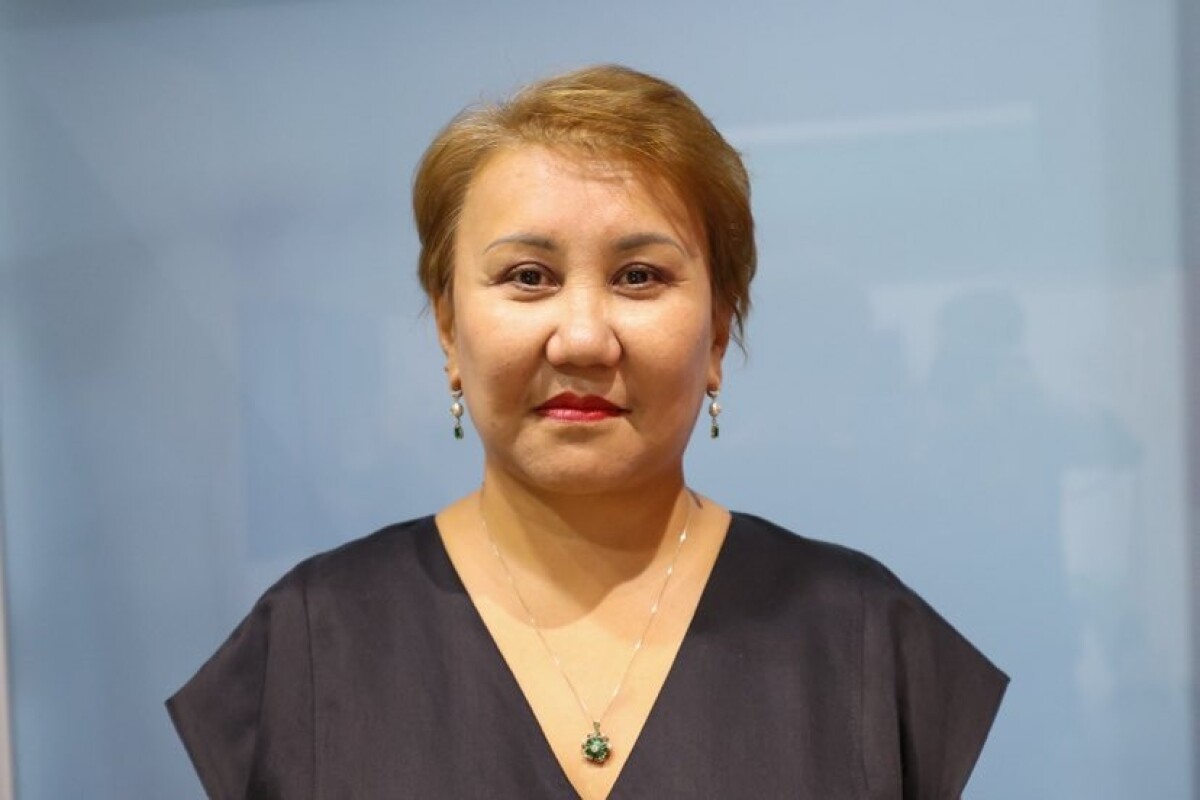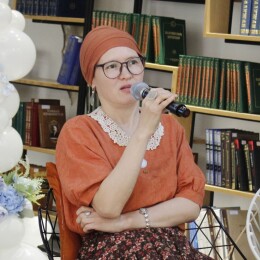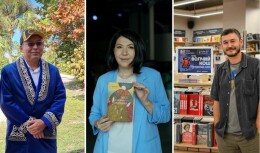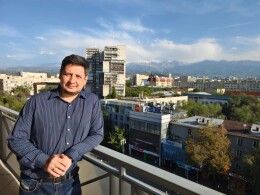For this next installation in an interview series with Kazakh authors, the Literary portal corresponded with Oral Arukenova, a novelist, poet, literary critic, translator, who writes in both the Kazakh and Russian languages. She was born in the village of Akadyr, the Karaganda region. The author graduated from the Institute of Foreign Languages in the city of Almaty, Kazakhstan, School of Management in Hamburg, Germany. For fifteen years, she held senior positions in international companies and multinational corporations. At present, she lives in Almaty. In 2015, she started writing fiction, thus changing her professional lifein many respects. Her prose and poetry were translated into German and English. The debut book “Rules of Neftyanka”, published by “Meloman Publishing” in 2018, was awarded by the independent literary contest “Altyn Kalam” in the category “Literary Debut of the Year”.
– Good day, Oral! What are you currently up to in your creative life?
– Malika, salute! Wonderful to see you. Right now, a lot is happening. I’ve written a bilingual book for children, which I want to be published shortly. The MECENAT.KZ website has decided to publish my piece “Alma-Mater” as a previous year’s finalist. Although I occasionally write poems, what matters most to me right now is the preparation for and defense of my PhD thesis this fall. I believe that scientific study is a creative process because I work in fiction. Even though my dissertation is almost complete, it’s still too early to declare satisfaction.
– You are both a poet and a writer, and when it comes to poetry, what, in your opinion, makes a good beginning and end to a poem?
- Every time it’s different. Sometimes a single idea gives me an idea for a poem. My best poems are those that I write fast and impulsively. Once, capturing a feeling or impression is all that is required. Even though such texts don’t even require editing, I normally set them aside for a while, because some poems combine numerous themes, so it’s crucial to polish them.
– How do you think, what is the strangest thing about the art of poetry?
- Nobody can tell if you are a poet or not, since poetry is unique in and of itself. Despite the enormous amount of emotions and sensations that are jammed into a few phrases, everything makes sense at some point. The strangest thing is that some people can understand these little sentences and even expound on them since they resonate with them personally.
– Could you name the situation that influenced your becoming a master of the pen in your adult life, and tell us about your first draft in poetry?
- My first attempt at poetry was many years ago, when I was a child, so I don’t remember it. As a mature person, I passed a poetry contest and was enrolled in a literary school to learn how to write poetry. At first, only the theory was clear, and the practice was a mess. Nevertheless, at some point, everything changed imperceptibly, and I spontaneously came up with an entire poem. I felt that it was good, so I sent it to my mentor, Pavel Bannikov. Pavel confirmed that it was indeed a poem. It was practically my first successful piece called “Pigeon Flock” and it was, by the way, published in the magazine “Prostor”. However, I didn’t feel like I had a good understanding of what poetry was, and I guess I’ll never quite get it. I seem to know nearly everything about prose, but, in my opinion, a full understanding of poetry is impossible – this fact is the reason for my interest in poetry.
– Would it be true to say that to some extent you are interested more in the process rather than in the outcome while writing a poem?
- From my perspective, no one considers the outcome while creating poetry. Of course, I want to create fantastic poetry, but that has nothing to do with the process. It is simply an inner need and a pleasure to write, even when the result is far from perfect.
- What motivates you to write poetry?
- Every time is different. The worst-case scenario is when the motivation for writing is lacking, but you never know. There is a misconception that one must experience pain or some negative emotion in order to create poetry, but for me, poems typically emerge when I am calm and at peace with myself.
– Were there any interesting and surprising moments in the publishing process?
- Publishers either accept the poems that poets submit for publication or don’t. I find it interesting that journals frequently don’t respond. I’ve been rejected twice without notification, but there’s nothing wrong with that, and nobody owes anyone anything. As a result, my poetry was published in other, even more renowned periodicals. All things work out for the best. For instance, a selection of mine that wasn’t published by a Russian magazine wound up in a good American magazine after being translated into English. Poetry is a distinctive element, as I’ve already stated. The most intriguing part is that while in the beginning I always wanted my poetry to be published, recently I’ve found that I can sometimes forget about it when I’m asked to send a selection of my works. It genuinely surprises me when my poetry is published without my consent sometimes or one of my poems is selected for review and publishing, or it appears on a list. As an illustration, poet Zoya Falkova once informed me that she had picked one of my poems from the online literary journal to be included in the “Metajournal”, a publication where poets and critics discuss poems. That was nice of her. Another time I found out online that my poem about a park translated into English was included in an anthology of the world’s great works at New York University. Twice, I also participated in a poetry seminar by Nazarbayev University, which was conducted in English. As a result, my poem “Empire” was published in the Nazarbayev University “Angime Journal”.
– Regarding prose, could you talk a little bit about the book “Rules of Neftyanka”? It’s a really great collection of stories with quite an interesting title.
- After five years, a lot has been said and written about this book. Timur Mussin, the director, teased his intention to make a film. The quarantine had just begun at that point. Maybe the project will start up again. When I was composing the first Petya story, the title just came to me. The same Pavel Bannikov encouraged me to preserve the title even though I wanted to modify it. An intriguing feature about this book is that I was contacted via social media one day by Sam Breazeale, an aspiring American translator, who offered to translate it into English. The collection of works by Kazakh women writers, AMANAT, which was released in the United States last year, contains two of his translated stories. I hope he’ll complete the translation so it may be offered for sale in English on Amazon. There is a Russian version available.
– How do you think about very short stories in this book? What makes a good short story?
- It’s challenging to write a story in a concise manner. But because my book has a general context, keeping stories brief wasn’t tough. The dialogues and actions of the characters helped me portray them. There are numerous depictions of Petya’s appearance, for example, despite the fact that the character still sounds the same.
– How do you feel about the collaboration with other poets or writers?
- When it’s something I’m interested in, working with my colleagues is a pleasure. I occasionally work on different projects with other poets and writers. For instance, I served as the head of the jury for the “Qalamdas” literary award the previous year. The Almaty Open Literary School and the “Daktil” online journal collaborated on this initiative, which was supported by Chevron and the U.S. Consulate in Kazakhstan. In 2022 and 2023, I took part in the Almaty Writing Residency as a resident and as a jury member.
– Could you share your plans in writing for the near future?
- As I mentioned, I’m working on my dissertation right now, but since poetry doesn’t require as much time as prose, it occasionally serves as a diversion. I want to complete the second installment of the novel “Alma Mater” in the future. The 1986 student uprising and the characters’ changes as a result of it were the focus of the first novel, which was set during the 1980s student years. The second book is about studying abroad in the late 1990s, when I first started to ponder about postcolonial issues. It describes my experience with the Western world and the changes that ensued. Additionally, I’d like to write a book about Soviet-era Kazakh literature from a modern-day perspective.
– If you could give only one piece of advice to other poets and prose writers, what would it be?
- To read more to develop into a watchful and enquiring bystander.
– Thank you for the interview!
- Thanks for your interesting questions!












